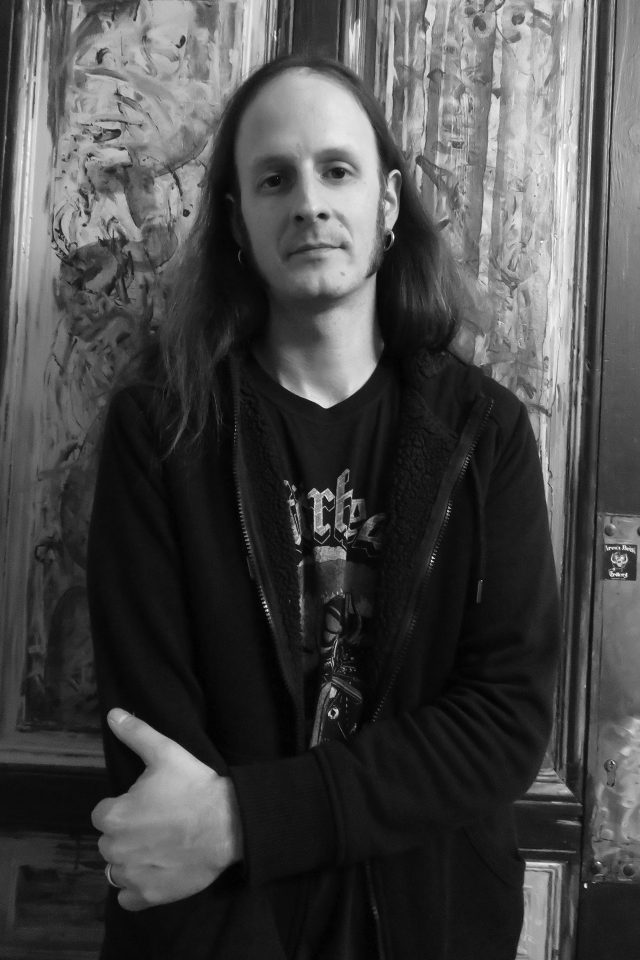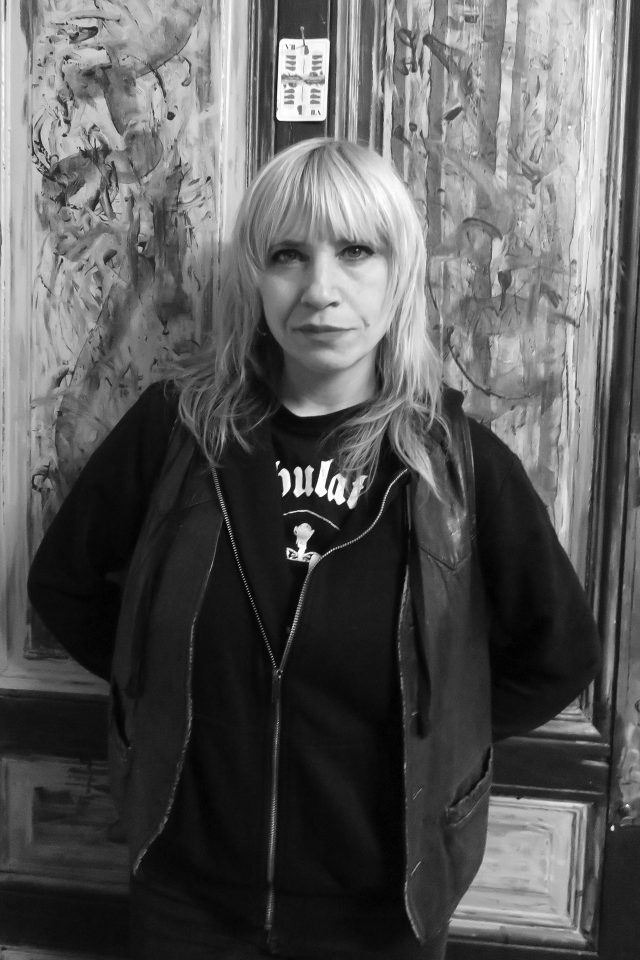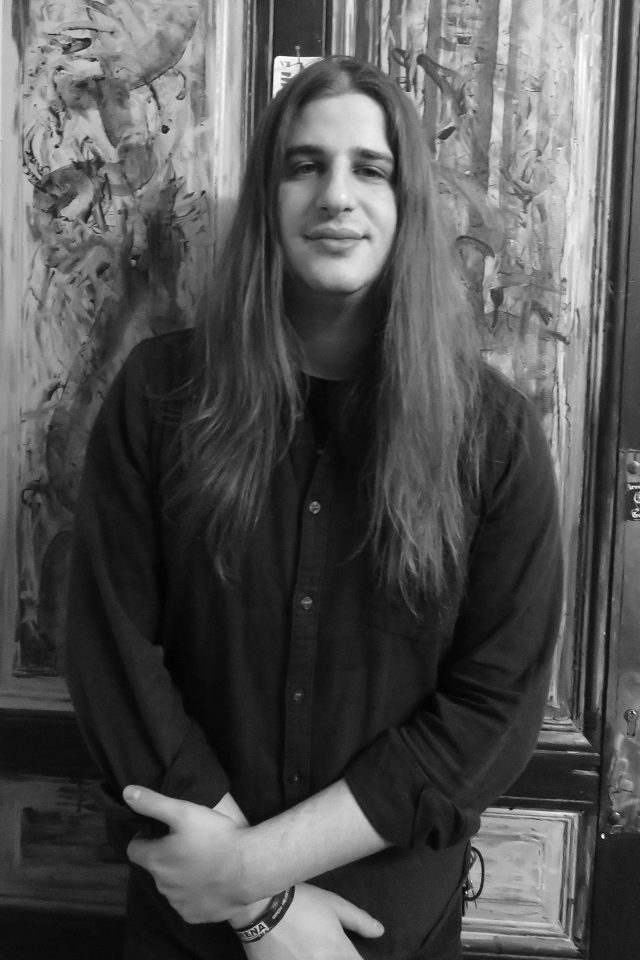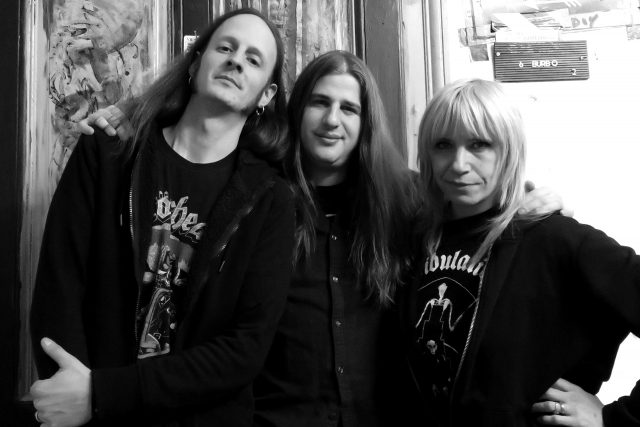
We talked to up-and-coming heavy metal trio Sanhedrin from Brooklyn, NYC, currently on tour in Europe. Between the sound check and their show in Vienna, Austria, Erica Stoltz (bass, vocals), Jeremy Sosville (guitar, backing vocals, also of Black Anvil), and Nathan Honor (drums) answered my nosy questions and even let me eat the candy that had been put in the backstage room for them.
What’s it like to tour Europe for the first time?
Nathan: It is amazing. The people here are amazing, the venues here are amazing, we’re having a great time.
Erica: Yeah. Vastly different from the United States.
Why?
Erica: Because I think that the place of artists in European culture is different from US culture.
Jeremy: There’s been a reaction to the music we write here that’s been surprising, it’s much more… varied, I guess you could say… This is the first time we’ve ever played to crowds where such a large amount of people in the audience already know our music, and they’re singing along… There’s a level of energy that we’re not accustomed to… But we’re getting used to it!
[Laughter]
How does it feel?
Nathan: It feels great. It feels amazing.
Is it getting to your head?
Jeremy: No. We’ve been doing this for too long with very little success, playing music, that having some now is… It’s more humbling.

What other impressions do you have about this side of the pond?
Erica: I’ve travelled a lot in Europe, but I haven’t been this far east before… So, the cultural differences between a Slavic and a Saxon country… I’m tasting it, I see it, I see in the architecture, you know, in the religious iconography, in all of it, so that’s fascinating to me… But as an artist, again, I think we’re more appreciated here.
You’re treated better?
Erica: Yeah.
Everybody says that.
[Laughter]
Jeremy: Especially American bands, I’m sure.
Yeah.
Nathan: We’re also appreciating the birds of prey. There’s been many birds of prey and we’ve been enjoying watching them swooping over the autobahns.
You don’t see them in the US?
Jeremy: We have, but we live in New York City, so… The only birds of prey there are pigeons.
Erica: There are peregrine falcons…
Jeremy: They’re around, but you don’t see them every day, just driving through the country side.
What’s life like in New York, in Brooklyn, apart from that?
Erica: We all work more than we want to. [Others agreeing] And you have to. To survive in that city.
What do you do for a living?
Jeremy: I work for a record label group, managing their warehouse.
Nathan: I’m a sound engineer at a venue, and I also freelance, and Erica does the same thing as me.
Erica: Yeah, I met him as audio crew in an opera house that we worked at, but now I actually teach that stuff, so I’m actually transitioning to teaching… Entertainment technology.

Can you make a living from teaching?
Erica: Well, I’m at a university, so it’s a little better paid, but… Yeah, you actually can. It’s not a great living, I mean you don’t get rich, by any means, but you can make it happen.
How do working and making music go together?
Nathan: We have a pretty good work ethic. We pay a lot of money for our rehearsal studio, so we try to get there as much as possible. Sometimes we miss practice, sometimes we make it up… It’s pretty good.
Jeremy: I think with the three of us working around music in the different ways that we do, it actually has helped the band. For example, me working at a record label and learning how to manage a project like that helped when it came time for us to self-release the first album. I already had contacts, I had record plants, I know how to engage in that process. It helps when we show up to gigs and we can tell the sound guy… We speak, these two speak their language, so we can get what we want much faster that way. So, everything kind of feeds everything.
Why Sanhedrin? Why did you choose the name Sanhedrin?
Nathan: It is a Hebrew word, it means to assemble, or the assembly, or council. And we… Our process is very democratic. We all contribute equally to the project.
Jeremy: There are very few decisions that get made in this band where all three of us are not involved, whether that’s creatively or on the administrative side, like deciding about tours, about album art, about all the businessy stuff that we don’t really like…
Nathan: But that you have to do…
Erica: We share that responsibility…
Jeremy: We share the responsibilities of being in the band, kind of all around.
Erica: But it was a cool sounding name, I think that has a lot to do with it. They were responsible for selling out Jesus Christ to the Romans. So, it’s probably, like, in a blasphemous way, joyous blasphemy.
Jeremy: And Metallica was taken already.
[Everybody laughing]
Erica: Slayer, taken.
Nathan: Judas Priest, taken.
Jeremy: All the good… We just kept naming stuff. Bon Jovi! It was, like, ‘That’s not your name!’
And who came up with Sanhedrin?
Nathan: I think Jeremy.
Jeremy: Yeah, I did. I was kind of in the back of my mind as a band name for many years.
Erica: He said, ‘I always wanted to be in a band called Sanhedrin.’
Nathan: And we said…
Erica: …Alright.
[more laughter]
Jeremy: It was, like, ‘That’s sounds cool. What does that mean?’… It was… We were having a hard time… We had a list of band names, most of them were awful, that we were sending to each other, and then one day at rehearsal I brought that out, because I had kind of forgotten about it, and then it came out at a rehearsal and it just… [snaps fingers] that was it.

You said your process is very democratic, but I know that Nathan is the youngest. Does that show? Apart from visually?
Jeremy: No. I think, when the door closes and we’re rehearsing and writing…
Nathan: We’re all the same.
Jeremy: Age, gender, religion, whatever the hell you want to… However you want to categorize us as people, goes out, it’s left behind.
Erica: We’re like disembodied spirits making music.
Jeremy: We have a connection that goes beyond anything that can be defined by worldly adjectives.
What does your writing process look like?
Jeremy: Typically, I write some riffs at my apartment. I’m always just playing guitar for fun at home, so… I’ll get some stuff that sort of works together. Sometimes it will be very close to complete already, but most of the time I get it to a point where… Because I want to collaborate with them, and then we get together, Erica will have vocals, Nate will have ideas about certain drum beats that maybe I didn’t even think of that turn out to be very cool, and then we just sort of talk, talk, talk, and work it all out, and then eventually at some point we all know ‘Oh, this song is done.’ Sometimes it takes a week or three minutes, for example. We wrote the song For The Wicked in literally three minutes. And then there are songs that we’re working on now that predate our first album that we haven’t finished yet.
Erica: You wrote For The Wicked in three minutes, but it took three years to finish, because the lyrics where one thing, and then right before we recorded I was like ‘You know what, that does not fit the album.’ So I rewrote the lyrics and that was probably three years after we’ve been playing the song.
Nathan: Yeah, we’re not afraid to revisit things. There are certain songs that have been cannibalized to create new, better songs. The process… Again, it starts with some riffs, it goes in the blender, it comes out one way, if it works, it works, if it doesn’t, we revisit it, until it’s good. And there’s a few things on the back…
Jeremy: We all kind of know when it’s done at the same time. And we have others, we have songs that we have performed live that… like in our early part of the band, that we still went… we’re like: this song is not done anymore. We thought it was done, now we’re going back, we’re rewriting it, because we don’t want to record it the way it is.
What’s it like to be a woman in a heavy metal band/in the heavy metal genre, Erica?
Erica: Well, you know… I’ve been playing in this space for a long time. I’ve had the benefit of being in a band with another woman for a really long time playing heavy metal music, so I’ve had a companion in the solitude, but… It can be interesting.
Jeremy: We’re her band mates, so it’s got to be awesome. [laughter]
Erica: I mean… We’ll put it this way: In general, I prefer the company of women most times, so it is a challenge for me to stay in my space and feel myself all the time.
Do you feel compartmentalized as a band because you’ve got a female singer?
Jeremy: By journalists, you mean?
Erica: Not so far.
Nathan: I don’t feel compartmentalized, but I do feel like we often get things like…
Jeremy: Female fronted!
Nathan: Yeah. ‘I usually don’t like so and so…’
Erica: Yeah, interestingly, a lot of men do not, apparently, like women singers…
Jeremy: Not a lot, but enough that are vocal…
Erica: Enough that have been vocal about it, you know, and that’s not the first time that I’ve heard it in my own daily… It’s something that certain people respond to negatively.
Jeremy: I would say that anybody that we’re involved with, who’s marketing us, or trying to get us attention… It’s never once come up like ‘Oh, we need to market you as female fronted’, or ‘We have to change this, or change that’… We would refuse to work with people like that. It’s all about the three people in the room, making the music, writing the songs and it doesn’t matter what they were born with and…
Erica: Or what kind of equipment they have.
Why heavy metal? Why traditional heavy metal?
Nathan: I don’t think that that’s something we decided.
Erica: Yeah, it just happened.
Nathan: We just got into a room and started playing stuff we like to play. [others confirm]
Jeremy: It’s what comes out, when the three of us create. We didn’t say, ‘Oh, traditional heavy metal is…’ I didn’t even know that term until like two years ago. And we’ve been at this longer than that. It’s a fitting term for a lot of music, including ours in some ways.
Erica: But these guys were in a band together prior to me coming along and that band had a certain…
Jeremy: It was like a hard rock kind of a sound. We wanted to take it in a different direction, because we have certain strings that feed off of each other that we weren’t getting out of the other band that come out in this band and so heavy metal is a big part of that. But as the records get written, we will keep exploring new stuff, too.
What are your plans for the future?
Jeremy: We’re going to break up after this tour.
[Laughter]
Nathan: We hate each other. [more laughter] No, we come back home and two days after we land, we play with Lucifer and Spell in Brooklyn at one of our favourite venues [Saint Vitus], and then we have an East Coast and a West Coast tour with Slough Feg, and then we’re working on plans for coming back to Europe, as soon as possible, hopefully by the end of the year. So, stay tuned.

You were just joking about it, but it’s often that when a band tours for the first time that relations get, you know, tricky.
Erica: That doesn’t happen. We’ve actually gotten closer through travelling together.
Jeremy: I was curious about that, too. I’m sure all three of us were, but there… It’s actually…
Erica: I like these guys more now.
Jeremy: That’s nice. Well, I don’t know… We didn’t know what was going to happen, we’ve never… I think the longest that we’ve been on the road before this was for five days. So, this is a big commitment to our relationship as friends, because we all get along. And so far… I think this tour will actually benefit our relationship to one another in the future, musically and, more importantly, personally.
Nathan: And also touring at this level, sometimes, I mean this is our first trip, so routing might not be ideal. We’re driving longer, we’re staying together more often, you know, it’s been really nice to not freak out at each other and to not have any issues in that respect.
Jeremy: It also helps that the band we’re going out with, Gatekeeper, they’re very easy to be around, they’re… You know, I’ve been on tour with bands where sometimes you’re like ‘I don’t think I’ll tour with that band any more’, when the tour is over, these guys…
Erica: We’re going to see them again.
Jeremy: We’re already talking about playing with them in Canada later this year, hopefully.
Erica: We got lucky.
Jeremy: We got lucky there.
Erica: But I’ve known Nathan… Me and Nate worked together really long hours for a lot of years. I feel like I’ve travelled with you.
Nathan: Yeah, exactly. We were able to go home at the end of the day, but sometimes the end of the day was sixteen hours later, and then we’d see each other bright-eyed and bushy-tailed in the morning.
Erica: So, I feel like I’ve already toured with Nate a little bit.
Nathan: Yeah, we’ve got ten years of touring under our belt together.
Thank you for the interview, guys.
Sanhedrin: Thank you.
The interview has been slightly edited for clarity. I also asked Jeremy what he things about Lords of Chaos, because his other band, Black Anvil, had played at the movie release party in New York. He said that he hasn’t watched it yet. He got a link, but it expired. And now he’s going to watch it once it’s out on certain streaming services. Which it probably will be pretty soon.
(Interview and Photos Slavica)
https://www.facebook.com/sanhedrinband
https://thesanhedrin.bandcamp.com

23/03/2019 at 5:36 am
Honestly the best new band I’ve heard in a long time!
Can’t wait for West Coast US gigs!